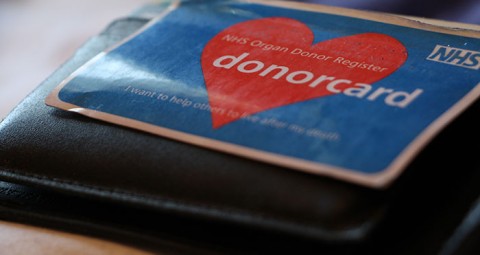May 12 | ![]() 0 COMMENTS
0 COMMENTS ![]() print
print

Donor proposals could lead to ‘state ownership’ of organs, Church warns
By Amanda Connelly
The Catholic Church has warned a new opt-out organ donor system proposed by the Scottish Government could lead to ‘state ownership’ of people’s organs.
The new ‘deemed consent’ system, which would see people being automatically placed on the organ donor register, and having to opt out of the system if they did not wish to donate, is being considered by the Scottish Government following a consultation.
Yet Church officials have voiced their concerns over the possible change, stating it is of utmost importance that the state recognises the human dignity of the individual.
“Presumed consent denies individuals the right to make an informed choice about organ donation,” Anthony Horan, director of the Catholic Parliamentary Office, said. “It is vital that those whose organs are removed are given all the information necessary to allow them to make a positive, well-informed choice about what they would like the state to do with their organs on their death.”
In the Church’s response to the Scottish Government’s consultation on the issue, he warned that ‘presumed consent effectively means state ownership of citizens’ organs until the citizen decides otherwise.’
“We repeat, it is a policy that seriously questions the need for the state to recognise the inherent dignity of each individual as, first and foremost, a human being and not just as a statistic,” he said.
“The Catholic Church acknowledges the need for more organs to be donated to allow those who are suffering the opportunity to enjoy a better quality of life. Indeed, the Church sees organ donation after death as a ‘noble and meritorious act’ to be encouraged as an ‘expression of generous solidarity.’
“It is a gift and a sign of great love for one another. However, in order for this to be a true gift, it must be freely given and that is why the Church also teaches that ‘it is not morally acceptable if the donor or his/her proxy has not given explicit consent.’”
He also spoke of the Church’s wish that the government would consider a similar method to the one adopted in Spain in 1989, which saw a change from the opt-out system to one that included investment in education and advertising, a national campaign, the establishment of a transplant organisation as part of the Spanish Ministry of Health, and ensuring that donor coordinators were available in all hospitals. As a result, organ donation in Spain doubled from 15 donors per million of the population to more than 30.
“Here in Scotland we could take the best of the Spanish system and to use it to the advantage of those most in need,” Mr Horan said. “Starting from the basis of the existing opt-in system, we can develop the way we manage organ donations, ensuring that there are suitably qualified personnel in every hospital committed to organ donation as well as undertaking a positive, eye-catching public awareness campaign through the media.
“If we do this, then there is no reason why we cannot experience the same significant increases enjoyed in Spain.
“Obviously, high profile awareness campaigns and organ coordinators cost money, while simply switching to an opt-out system doesn’t, but with lives at stake, we should be willing to invest in proven models which lead to the outcomes we’d all support.”
The Scottish Government are considering using a similar system the Welsh Government implemented at the end of last year, which sees the law applied to anyone living in Wales for more than a year, with exemptions for prisoners and members of the armed forces, unless they have expressed their consent to become organ donors.
NHS Blood and Transplant hope to see a similar approach adopted in Scotland.
Feedback from 787 organisations and individuals in response to the government consultation has been published online, with an overwhelming majority supporting the proposed changes.
“The available international evidence supports the fact that ‘opt out’ legislation is associated with increased rates of deceased organ donation,” Professor Mark Strachan from the Royal College of Physicians in Edinburgh said. “The higher rate of organ donation in ‘opt out’ jurisdictions persists even when the next of kin are still asked for their approval before retrieval—this is termed ‘soft’ opt out as opposed to ‘hard’ opt out when the relatives are not consulted.
“A higher rate of organ donation will reflect increased public awareness, societal attitudinal change to donation, and improved clinical infrastructure.”











